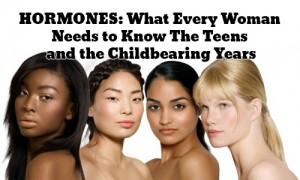Hormones rule our lives; it’s a simple fact of biochemistry. In their role as the body’s chemical messengers, hormones affect every human biological system. Without them, nothing works correctly.
Women’s hormonal systems are as complex as men’s, although vastly different. They govern reproduction, plus every aspect of health—including metabolizing food, proper immune function, physical and emotional responses to stress and the aging of cells.
Teens and Early 20s
Puberty and the early reproductive years should be the physical peak of a young woman’s life when she is physically active; full of energy and youthful health. It’s also the time when breasts develop, hips widen, pubic hair appears, menstruation begins and she becomes physically capable of pregnancy.
The good news is that several studies by the National Cancer Institute and the University of California, Los Angeles, have shown that regular exercise undertaken at this age results in lower estrogen levels throughout a woman’s life, greatly reducing her risk of breast cancer and other hormonal cancers.
Yet, C.W. Randolph, Jr., a leading bio-identical hormone physician and co-author of From Hormone Hell to Hormone Well, reports that the ideal hormonal balance is routinely upset today. Culprits are obesity among young American women and the everyday presence of toxic estrogenic chemicals in today’s dairy products and meat, personal care products, plastics, food containers, pesticides and herbicides as well as car exhaust.
“These compounds often have chemical structure similar to estrogen and can act like estrogen when introduced into the body,” Randolph explains. “Over time, these substances can increase estrogen in the body, potentially causing problems.”
Categorized as xenoestrogens, these hormone disruptors can cause rapid growth in breast tissue and have been blamed for the appearance of breast tissue and even milk production in girls as young as 18 months and the early onset of puberty, particularly among African-American girls. They are also suspected in the rising incidence of breast cancer in younger women today.
Reproductive Years
Women in their reproductive years often experience extreme stress in struggling to balance family, work, relationships and a need for personal growth, along with economic challenges. Women’s health expert Dr. Christiane Northup, author of The Wisdom of Menopause, blames the stress of modern lifestyles for hormone disruptions in women in their childbearing years. “The stress hormones cortisol and epinephrine can have long-term effects on all other hormones,” advises Northrup.
Concurrently, many women sacrifice self-nurturance in order to nurture others. The first result is often premenstrual syndrome (PMS), which Northrup calls a “lifestyle disease.” “We know that this problem seems to worsen with each subsequent child. That made the connection for me,” she adds, “that with growing families and responsibilities, women no longer take care of themselves as well; no longer get the amount of exercise they once did. The body is quite forgiving in their 20s, much less so in their 30s.”
Part of the result is the attempt to reduce stress levels by eating high-fat and high-sugar comfort foods. Weight gain, blood sugar imbalances and sex hormone imbalances follow.
“Excess blood sugar changes the way estrogen, progesterone and testosterone are metabolized,” Northrup explains. “PMS and other problems of the reproductive years often go away when you get your blood sugar balanced, but—here’s the rub—you won’t get it rebalanced unless you are addressing the very real stressors in your life.”
Due to the presence of xenoestrogens and Americans’ general fondness for processed comfort foods, women in their childbearing years are also increasingly afflicted by polycystic ovary syndrome (PCOS), a condition characterized by overproduction of testosterone and other male hormones. Insulite Laboratories, in Louisville, Colorado, reports that infertility and early onset Type 2 diabetes, another hormonal imbalance problem, are closely connected to PCOS.
The first priority for every woman at any age, counsels Northrup, is to get blood sugar (glucose) under control. “Get a glucometer. You don’t need a prescription. If your blood sugar level isn’t between 80 and 90 in the morning, you need to look at your diet and lifestyle. Getting this under control will create hormonal balance in the vast majority of women. It’s so simple.”







